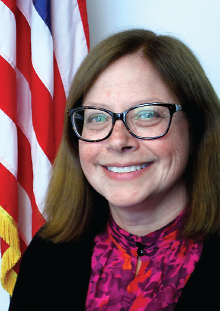McCance-Katz Tapped for New Post Directing SAMHSA
Abstract
An APA member and expert in substance use disorders is being considered for a new leadership position in Health and Human Services created by the 21st Century Cures Act.
President Donald Trump has announced his intention to nominate Elinore McCance-Katz, M.D., Ph.D., a psychiatrist with a subspecialty in addiction psychiatry, to serve in the new post of assistant secretary for mental health and substance use in the Department of Health and Human Services.

As chief medical officer at SAMHSA, Elinore McCance-Katz, M.D., Ph.D., played a key role in providing a medical perspective to the agency’s work and advocated for the advancement of evidence-based approaches to treating behavioral health conditions.
The nomination is a win for APA, which had been advocating for McCance-Katz’s selection in discussions with the White House. Staff of APA’s Division of Government Relations told Psychiatric News that McCance-Katz brought to the table the skills and experience that the White House—and APA—hoped to see in the position: a strong scientific and medical background with a focus on substance use and experience working at the federal level.
If confirmed, McCance-Katz will replace Acting Assistant Secretary Kana Enomoto. At press time, it was anticipated that the Senate hearing on her nomination should take place within the next couple of months. APA members are urged to contact their senators to support her nomination.
McCance-Katz is currently the chief medical officer for the Rhode Island Department of Behavioral Healthcare, Developmental Disabilities, and Hospitals. She is also a professor of psychiatry and human behavior and a professor of behavioral and social sciences at the Alpert Medical School at Brown University.
McCance-Katz previously served as the first chief medical officer of the federal Substance Abuse and Mental Health Services Administration (SAMHSA). A long-time member of APA, McCance-Katz led the Physicians’ Clinical Support System for Buprenorphine (PCSS-B), funded by SAMHSA grants, in collaboration with APA’s Council on Addiction Psychiatry. The program, which is the predecessor to the current Providers’ Clinical Support System for Medication-Assisted Treatment (PCSS-MAT), helps train physicians to prescribe buprenorphine for opioid-dependent patients using distance-learning tools. APA was a partner organization in the PCSS-B, as it is with the PCSS-MAT.
McCance-Katz obtained her Ph.D. from Yale University with a specialty in infectious disease epidemiology and is a graduate of the University of Connecticut School of Medicine. She is board certified in general psychiatry and in addiction psychiatry.
“Dr. McCance-Katz is an accomplished physician who will bring expertise and impressive experience to this critical leadership role,” APA President Maria A. Oquendo, M.D., Ph.D., told Psychiatric News. “As assistant secretary for mental health and substance use at SAMHSA, she will be able to help shape federal policy affecting research on and treatment of substance use disorders. We welcome the perspective that a psychiatrist and addictions expert can bring to this urgent public health problem. APA strongly supports her nomination.”
APA CEO and Medical Director Saul Levin, M.D., M.P.A., echoed those comments. “Dr. McCance-Katz possesses a unique blend of academic and public sector experiences squarely focused on mental health and substance use disorders, as well as prior experience working in the federal government, having served as the chief medical officer at SAMHSA. We are pleased that the president agreed with us that this position calls for the kind of leadership that Dr. McCance-Katz can bring to SAMHSA—the perspective of a physician with a broad and deep background in mental health and substance use prevention, early intervention, treatment, recovery services, and research. She will also help bring together agencies across the federal government to coordinate related programs and research, with an emphasis on science and evidence-based programs.”
Ariel Gonzalez, J.D., APA’s chief of Government Relations, told Psychiatric News that in discussions with White House staff leading up to the announcement about her nomination, APA leadership strongly supported McCance-Katz. “She was the candidate we endorsed,” he said. “The White House wanted someone with a strong scientific and medical background with expertise in substance use. That made Dr. McCance-Katz a perfect fit for the position. Our next priority will be her confirmation in the Senate. We will be working with the Senate leadership emphasizing the strengths she brings to this role.”
The position of assistant secretary for mental health and substance use was created under the 21st Century Cures Act, signed by President Obama on December 13, 2016. According to the law, the assistant secretary will evaluate and coordinate programs within SAMHSA, promote evidence-based best practices regarding the prevention and treatment of mental health and substance use disorders, assess the use of performance metrics to evaluate programs and activities, and ensure that such metrics are used to evaluate grant programs.
The 21st Century Cures Act incorporated elements of legislation previously put forth by Reps. Tim Murphy (R-Pa.) and Eddie Bernice Johnson (D-Texas) in the Helping Families in Mental Health Crisis Act and the Mental Health Reform Act of 2016, sponsored by Sens. Chris Murphy (D-Conn.) and Bill Cassidy (R-La.). APA worked closely with those legislators to help craft the mental health provisions in the final bill, including retention of the proposed assistant secretary position.
The 21st Century Cures Act also supports recruitment, training, and retention of the mental health workforce by authorizing a demonstration program that provides five-year grants for residents and fellows who practice psychiatry and addiction medicine in underserved communities. Other mental health clinicians are eligible for similar grants. To combat the opioid epidemic, the law provides $1 billion over two years to bolster prescription drug monitoring programs, implement prevention activities, provide training for health care providers, and expand access to opioid treatment programs. ■



